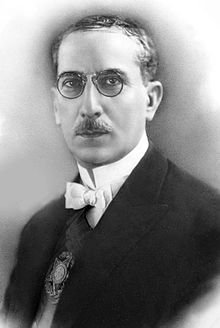Artur Bernardes | |||||||||||||||||||||||||||||||
|---|---|---|---|---|---|---|---|---|---|---|---|---|---|---|---|---|---|---|---|---|---|---|---|---|---|---|---|---|---|---|---|
 Official portrait, 1922 | |||||||||||||||||||||||||||||||
| 12th President of Brazil | |||||||||||||||||||||||||||||||
| In office 15 November 1922 – 15 November 1926 | |||||||||||||||||||||||||||||||
| Vice President | Estácio Coimbra | ||||||||||||||||||||||||||||||
| Preceded by | Epitácio Pessoa | ||||||||||||||||||||||||||||||
| Succeeded by | Washington Luís | ||||||||||||||||||||||||||||||
| |||||||||||||||||||||||||||||||
| Personal details | |||||||||||||||||||||||||||||||
| Born | 8 August 1875 Santa Rita do Turvo, Minas Gerais,[a] Empire of Brazil | ||||||||||||||||||||||||||||||
| Died | 23 March 1955 (aged 79) Rio de Janeiro, Federal District, Brazil | ||||||||||||||||||||||||||||||
| Cause of death | Myocardial infarction | ||||||||||||||||||||||||||||||
| Resting place | São João Batista Cemetery | ||||||||||||||||||||||||||||||
| Political party | PRM (c. 1904–1937) UDN (1945) PR (1945–1955) | ||||||||||||||||||||||||||||||
| Spouse |
Clélia Vaz de Melo (m. 1903) | ||||||||||||||||||||||||||||||
| Children | 8, including Artur Filho | ||||||||||||||||||||||||||||||
| Alma mater | Faculty of Law of São Paulo (LL.B.) | ||||||||||||||||||||||||||||||
| Occupation |
| ||||||||||||||||||||||||||||||
| Signature | |||||||||||||||||||||||||||||||
Artur da Silva Bernardes[b] (8 August 1875 – 23 March 1955) was a Brazilian lawyer and politician who served the 12th president of Brazil from 1922 to 1926. Bernades' presidency was marked by the crisis of the First Brazilian Republic and the almost uninterrupted duration of a state of emergency. During his long political career, from 1905 until his death, he was the main leader of the Republican Party of Minas Gerais (PRM) from 1918–1922 until the party's closure in 1937, and founder and leader of the Republican Party (PR).
Before his presidency, Bernardes served as president (governor) of Minas Gerais from 1918 to 1922, during which time he founded the current Federal University of Viçosa and prevented American investor Percival Farquhar from exploiting the iron ore deposits in Itabira, cultivating an image of a nationalist and municipalist leader. A status quo and "milk coffee" candidate in the 1922 presidential election, Bernardes was the target of fake letters to harm his image and an attempted coup d'état to prevent his inauguration, the Copacabana Fort revolt. His administration was unpopular in the cities, especially in Rio de Janeiro, and from July 1924 onwards he was attacked by conspiracies and armed uprisings by tenentist rebels.
Bernardes' attitude towards the opposition was uncompromising and authoritarian. Out of the states that opposed his candidacy, Rio de Janeiro and Bahia had their dominant parties overthrown, and Rio Grande do Sul fell into a civil war, the Revolution of 1923, in which the federal government brokered a peace deal. In the capital, the political police were reorganized into the 4th Auxiliary Police Bureau. Hundreds of rebel military personnel and civilians died in the bombing of São Paulo and the penal colony of Clevelândia. No amnesty was granted to the rebels. The government repressed militant workers, especially anarchists, while simultaneously enacting some labor laws.
The administration also applied an economic policy of austerity and monetary contraction, fighting inflation and currency devaluation, withdrew Brazil from the League of Nations, carried out a centralizing constitutional reform, the only one to the Brazilian Constitution of 1891, and brought the State closer to the Catholic Church. After his presidency, Bernardes took part in the Revolutions of 1930 and 1932, and saw the PRM reduced to a minority faction in Minas Gerais. In his last years he participated in the campaign for state monopoly on oil in Brazil. An austere and reserved man, Bernardes was idolized by his followers, the so-called Bernardists, and hated by his enemies.
Cite error: There are <ref group=lower-alpha> tags or {{efn}} templates on this page, but the references will not show without a {{reflist|group=lower-alpha}} template or {{notelist}} template (see the help page).